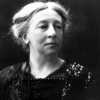Lady Gregory

Lady Gregory
Isabella Augusta, Lady Gregorywas an Irish dramatist, folklorist and theatre manager. With William Butler Yeats and Edward Martyn, she co-founded the Irish Literary Theatre and the Abbey Theatre, and wrote numerous short works for both companies. Lady Gregory produced a number of books of retellings of stories taken from Irish mythology. Born into a class that identified closely with British rule, her conversion to cultural nationalism, as evidenced by her writings, was emblematic of many of the political struggles to...
NationalityIrish
ProfessionDramatist
Date of Birth15 March 1852
CountryIreland
I don't know in the world why anyone would consent to be a king, and never to be left to himself, but to be worried and wearied and interfered with from dark to daybreak and from morning to the fall of night.
What are prophecies? Don't we hear them every day of the week? And if one comes true there may be seven blind and come to nothing.
Our curses on them that boil the eggs too hard! What use is an egg that is hard to any person on earth?
I feel more and more the time wasted that is not spent in Ireland.
The way most people fail is in not keeping up the heart.
Many a poor soul has had to suffer from the weight of the debts on him, finding no rest or peace after death.
It takes madness to find out madness.
Well, there's no one at all, they do be saying, but is deserving of some punishment from the very minute of his birth.
Every day in the year there comes some malice into the world, and where it comes from is no good place.
From the sons of Ith, the first of the Gael to get his death in Ireland, there came in the after time Fathadh Canaan, that got the sway over the whole world from the rising to the setting sun, and that took hostages of the streams and the birds and the languages.
I hold that the beginning of modern Irish drama was in the winter of 1898, at a school feast at Coole, when Douglas Hyde and Miss Norma Borthwick acted in Irish in a Punch and Judy show; and the delighted children went back to tell their parents what grand curses 'An Craoibhin' had put on the baby and the policeman.
In writing a little tragedy, 'The Gaol Gate,' I made the scenario in three lines, 'He is an informer; he is dead; he is hanged.' I wrote that play very quickly.
In my childhood there was every year at my old home, Roxborough, or, as it is called in Irish, Cregroostha, a great sheep-shearing that lasted many days. On the last evening there was always a dance for the shearers and their helpers, and two pipers used to sit on chairs placed on a corn-bin to make music for the dance.
I'll take no charity! What I get I'll earn by taking it. I would feel no pleasure it being given to me, any more than a huntsman would take pleasure being made a present of a dead fox, in place of getting a run across country after it.